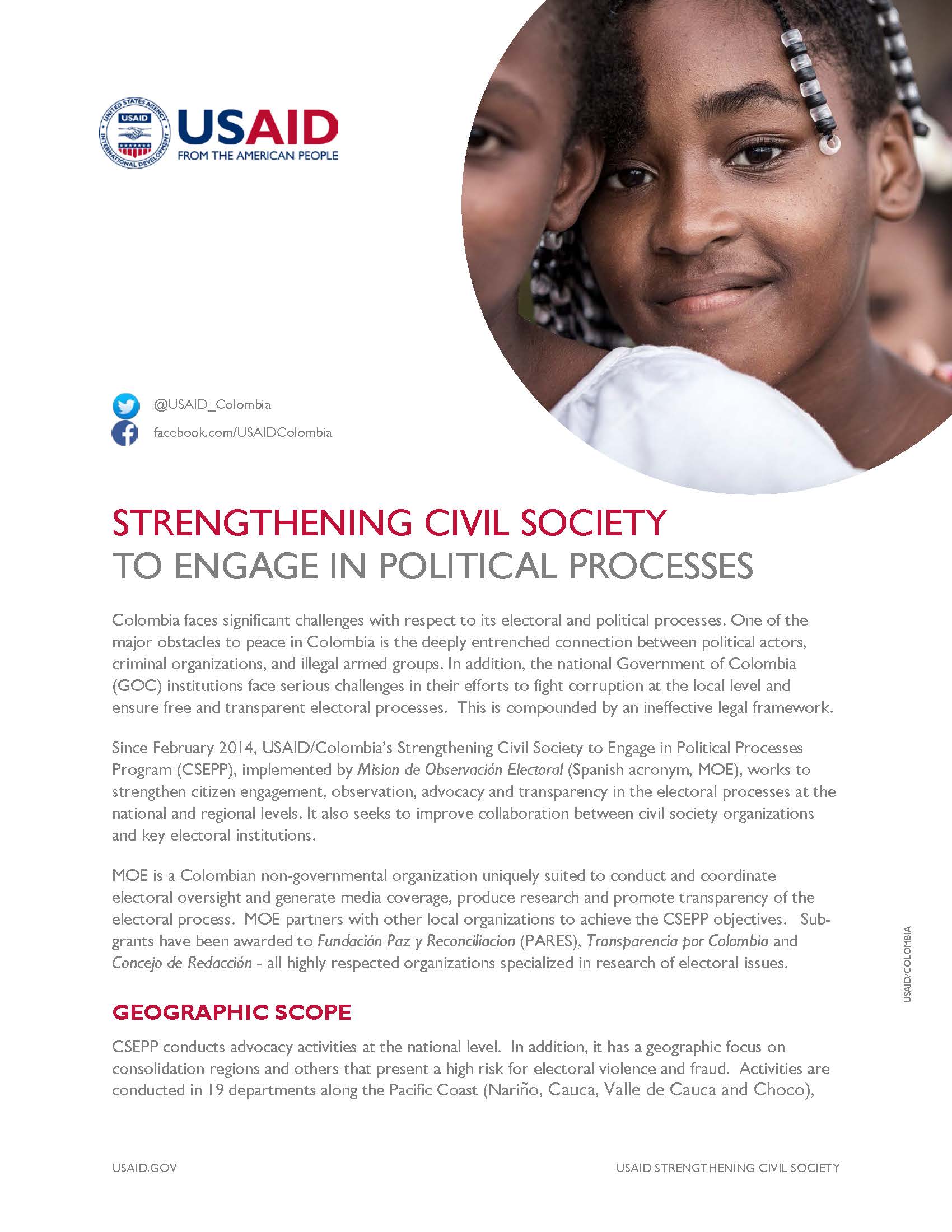Since February 2014, USAID/Colombia’s Strengthening Civil Society to Engage in Political Processes Program (CSEPP), implemented by Mision de Observación Electoral (Spanish acronym, MOE), works to strengthen citizen engagement, observation, advocacy and transparency in the electoral processes at the national and regional levels. It also seeks to improve collaboration between civil society organizations and key electoral institutions.Colombia faces significant challenges with respect to its electoral and political processes. One of the major obstacles to peace in Colombia is the deeply entrenched connection between political actors, criminal organizations, and illegal armed groups. In addition, the national Government of Colombia (GOC) institutions face serious challenges in their efforts to fight corruption at the local level and ensure free and transparent electoral processes. This is compounded by an ineffective legal framework.
MOE is a Colombian non-governmental organization uniquely suited to conduct and coordinate electoral oversight and generate media coverage, produce research and promote transparency of the electoral process. MOE partners with other local organizations to achieve the CSEPP objectives. Sub-grants have been awarded to Fundación Paz y Reconciliacion (PARES), Transparencia por Colombia and Concejo de Redacción - all highly respected organizations specialized in research of electoral issues.
GEOGRAPHIC SCOPE
CSEPP conducts advocacy activities at the national level. In addition, it has a geographic focus on consolidation regions and others that present a high risk for electoral violence and fraud. Activities are conducted in 19 departments along the Pacific Coast (Nariño, Cauca, Valle de Cauca and Choco), the Caribbean Coast (Sucre, Bolivar and La Guajira) and the Southeastern part of the country (Putumayo, Caquetá, Guaviare, Meta, Vaupés, Amazonas, Guainía and Vichada) where there are large Afro-Colombian and indigenous populations. Additionally, the program works in Andean zone departments of Tolima, Antioquia and Norte de Santander, as well as in the Montes de María region.
PROGRAM OBJECTIVES
- Produce timely and accurate information about political and electoral dynamics to generate early warnings that can be used by the GOC.
- Advocate for increased political participation of women in the electoral process.
- Advocate for electoral reform.
- Assist GOC with the oversight of the electoral process and in the investigation and sanction of electoral crimes.
- Increase capacity of civil society and the media to disseminate information on electoral irregularities and fraud.
- Enhance citizen participation and control through electoral observation.
KEY ACHIEVEMENTS
- In the 2014 electoral cycle, MOE’s Pilas Con El Voto Web page received an increase of 400 percent in citizen complaints on possible irregularities and crimes, as compared to 2010.
- MOE’s Pilas Con El Voto Web page accounted for 65 percent of the total number of complaints received by Colombian authorities during 2014 elections. In 2015, the GOC built its citizen complaints Web page using MOE’s as a model.
- MOE deployed 11,373 citizens as observers for the three 2014 elections, covering 77 percent of the electorate.
- MOE produced Electoral Risk Maps (ERM) for the 2015 elections that showed that 487 municipalities presented risk for electoral fraud (10 percent less than four years prior) and 438 municipalities were deemed at risk for violence (2 percent less). Risk of violence and electoral fraud were evident in 204 municipalities (15 percent less).
- Evidence provided to and used by the Attorney General’s Office (AGO) for the investigation of electoral crimes.
- Initiated pilot project to study political campaign expenditures in cooperation with National Electoral Council.
Related Links








Comment
Make a general inquiry or suggest an improvement.